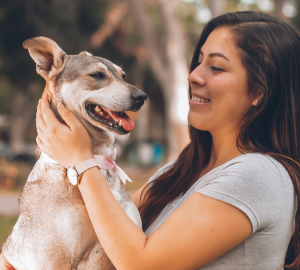Are you noticing that your dog is scooting his bottom along the floor, grass, or rug? Though your furry pooch seems quite normal and happy, if you see your dog scooting often, it means there may be some issue. Every dog parent should know that some underlying problems may cause your dog to scoot frequently. So, never take this condition lightly.
While there are several reasons for dog scooting, some effective home remedies for dog scooting can help you ease your dog as well as can also work in preventing them from scooting around. The good news is that you can treat your dog at home and relieve their discomfort using these easy and simple home remedies.
But before we move to the natural remedies for dog scooting, it would be good to look at the reasons that cause your dog to scoot.
What Is Dog Scooting?

If you are a first-time dog owner, you may not be aware of dog scooting. Though this is not an emergency condition, it is also not a normal behavior among dogs. But, it is important to know the reasons why your dog is doing it. It is recommended to pull your dog’s tail up and check for the possible signs of redness, swelling, or any kind of abnormal signs. If you do not find any sign of irritation, it may be possible that your dog is suffering from itching or constipation. At this point, you should call your vet to find the actual problem.
If you notice that your dog is scooting on the ground, it means that something is wrong. The dog may be in pain, not comfortable, dealing with itching, or he is suffering from constipation. Some dog parents do not take this situation seriously. But, you should know that your dog is trying to tell you that not everything is ok. Also, there are a number of reasons for dog scooting. These can be worms, parasites, anal gland disorders, an injury, or any other issue. As a pet parent, it is your responsibility to find the exact reason for your dog’s changing behavior. Always remember that some conditions can be serious, and they need immediate treatment. You can either take the help of home remedies for dog scooting or consult your vet for the same.
What Are The Reasons For Dog Scooting?
Here are some of the common reasons for dog scooting.
Anal Gland Infection
Anal glands produce fluid when your dog excretes. When these glands get inflamed and infected, it causes scooting. Due to this infection, a dog is not able to drain the glands on its own. There are some dog breeds that are more prone to experience anal gland infection.
Worms
Worms are also one of the common reasons for dog scooting. These worms can easily be seen in your dog’s feces or around their anus. Due to these worms, your dog experiences highly uncomfortable and itching situations. This will lead to dragging their butt to get relieved. To get rid of worms in your dog, the best idea is to consult a vet.

Allergies
Sometimes, allergies in dogs can also make them itchy all over their body. You must also know that dogs are more likely to get seasonal allergies, food allergies, etc. Due to their dry, flaky skin and yeast infection, they feel like dragging on the floor. If you suspect any kind of allergy in your dog, it is better to find out the cause of this allergy.
Constipation
If your dog is experiencing hard-to-pass feces, they may be scooted to get relief from the pain. This also helps in stimulating your dog to go easier. Though this may not be the right answer for dog scooting, it may help in adjusting your dog’s diet.
Feces Stuck on Hair
When your dog is dealing with loose stools, it is more likely to stick on its hair. So, it is important to check the rear of your dog for any poop or any kind of debris. This may help in easing the problem quickly. Also, it would be a good idea to keep your dog’s hair short as it will help in preventing anything from sticking to their hair.
Prolapse
Sometimes, it may happen that your dog scoots because of prolapse. When you see that some part of their rectum comes out of their anus, it means your dog has a prolapse. Make sure to treat this condition by a vet as soon as possible. It will help in preventing any further infection.
What Are The Home Remedies For Dog Scooting?
Now, once you are familiar with the possible causes of dog scooting, it would be good to talk about treating this condition using some effective natural remedies. You can try these remedies at home to relieve the issues and can also help in preventing the recurrence of dog scooting.
Keep Your Dog’s Bottom Clean
If you notice that your dog’s bottom is not clean and has feces or any debris stuck to it, it should be cleaned immediately. You should also check your dog’s bottom for ticks or fleas, as it will also cause itching and will force your dog to scoot. You will see your dog dragging his bottom on the ground to get relief from discomfort and itching. So, make sure that your dog’s bottom should always be clean.
You can wash your dog’s butt with soap and clean water. Make sure to remove the poop and mud properly. If you have pet wipes, you can also use them to clean your dog’s butt. If you notice any insects or parasites once your dog comes back home, make sure to remove them immediately.
Increase Intake of Fiber
As per some research, it has been found that adding more fiber to your dog’s diet can help greatly in reducing the frequency of anal gland infections. The increased intake of fiber can also help in reducing constipation issues, which is one of the causes of dog scooting. One of the best ways to add fiber to your dogs’ diet is to get some tasty chews containing a high amount of fiber. This can help in relieving chronic constipation. This will make your dog feel comfortable and will also prevent them from scooting. High-fiber foods for dogs are carrots, pumpkin, sweet potatoes, and others. They are highly effective in easing your dog’s bowel movement.
Use Witch Hazel
Have you just noticed that your dog’s bottom is red and sore? You can use witch hazel as one of the best natural remedies for dog scooting. This will not only work as a natural disinfectant but will also give relief to your dog from an itchy bum. Make sure to use a witch hazel without containing strong perfumes, coloring, and alcohol as it may irritate their skin. The anti-inflammatory properties of witch hazel make it one of the preferred remedies to treat scooting or itching problems in your dog. You just need to pour some witch hazel on the cotton and pat it on your dog’s bum. It will give your pet some relief from itching.

Increase Intake of Water
If your dog loves to eat dry kibble and is constantly dealing with anal gland infections, remember it’s time to change your dog’s diet. Make sure to add a little moisture to your dog’s diet. Always keep in mind that the waterworks quite effectively in draining anal sacs. It will work great for dogs who are more prone to scooting issues.
The best way is to give some canned food or some gravy to your dog in order to solve this problem. Also, make sure that your dog is drinking enough water as it will help in draining his anal glands. It is also seen that dogs prefer drinking moving water instead of still water. So, it would be good to install a drinking fountain in your yard. This idea will encourage your dog to drink more water.
Add Probiotics To Your Dog’s Diet
If your dog is suffering from diarrhea, it means your pet will not be able to express its anal glands. In this case, using probiotics can help greatly in managing this problem. It will help in stabilizing your dog’s digestive tract and will also stabilize their poop.
Adding probiotics to your dog’s diet is a great home remedy for dog scooting. It will help in making their anal glands function properly. So, make sure to give foods containing a high amount of probiotics, such as yogurt. This will help in reducing inflammation in your dog’s gut, along with emptying their anal sacs effectively.
Use Fish Oil
Fish oil is a beneficial remedy for both humans and animals. So, there is nothing to surprise when you get to know that fish oil can be used as one of the effective home remedies for dog scooting. Fish oil has anti-inflammatory properties that help greatly in reducing the swelling and discomfort in the anal sacs.
Once your dog gets relief from swelling, it will be able to express its anal glands naturally. The best way to enjoy its benefits is to give fish oil supplements to your dog. You can add them to your dog’s food and help them reduce scooting.
Epsom Salt Compress
Just like using witch hazel as the home remedy to treat dog scooting, Epsom salt also works effectively in the same way. Epsom salt has powerful healing properties and can help in reducing swelling around the anus, soothing sores, and relieving itching.
All you need to do is to take a clean cloth and soak it in a mixture of warm water and Epsom salt. Now, use this rag as a warm compress to your dog’s bottom to heal the irritation. For better results, it is recommended to use an Epsom salt compress three times a day. It will help greatly in relieving your dog’s anal glands as well as stopping the scooting. Make sure to use unscented and purest Epsom salt.

Weight Loss
All dog owners must be aware of the fact that overweight dogs are more prone to get chronic anal gland inflammation. So, if your dog is overweight, it becomes important to keep your dog in a well-maintained weight to fight this problem. The best way is to keep your dog active as it will help with immunity and also make your pet able to fight the infections that cause anal gland issues.
It is also significant to feed your dog a healthy diet. Make sure to avoid giving fatty foods. You must know that a healthy diet helps in reducing pressure on your dog’s anal glands, and also your pet will be able to empty them easily.
FAQs
When to see the vet for dog scooting?
If your dog is dealing with repeated problems with its anal sacs, you should take him to the vet immediately. If you notice anal sacs inflammation, it is better to consult the vet before the situation gets worse. The vet will diagnose and solve the problem.
What dog breeds need their anal glands expressed?
All dog breeds may experience anal gland problems. Some dog breeds may have this issue one time, while for some breeds, it is a continuous thing. Though this is an uncomfortable condition for dogs, it can be managed with proper treatment.
Some dog breeds, such as beagles, basset hounds, and small poodles, are more prone to anal gland issues. They may need their anal glands expressed every few months.








